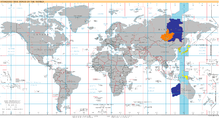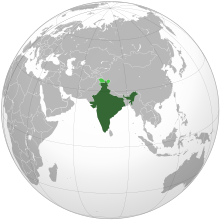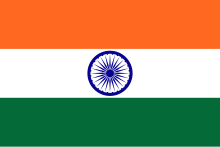India
Translingual edit
 |
|---|
| India [1] |
 |
| India [2] |
 |
| India [3] |
Alternative forms edit
Etymology edit
Pronunciation edit
Noun edit
India
- (international standards) NATO, ICAO, ITU & IMO radiotelephony clear code (spelling-alphabet name) for the letter I.
- (nautical) Signal flag for the letter I.
- (time zone) UTC+09:00
| code | Alfa | Bravo | Charlie | Delta | Echo | Foxtrot | Golf | Hotel | India | Juliett | Kilo | Lima | Mike |
|---|---|---|---|---|---|---|---|---|---|---|---|---|---|
| November | Oscar | Papa | Quebec | Romeo | Sierra | Tango | Uniform | Victor | Whiskey | Xray | Yankee | Zulu |
Translations edit
References edit
- ^ DIN 5009:2022-06, Deutsches Institut für Normung, 2022 June, page Anhang B: Buchstabiertafel der ICAO („Radiotelephony Spelling Alphabet“)
English edit


Etymology edit
Inherited from Old English India, Indea, from Latin India, from Ancient Greek Ἰνδία (Indía), from Ancient Greek Ἰνδός (Indós, “Indus river”), from Old Persian 𐏃𐎡𐎯𐎢𐏁 (hindūš), from Sanskrit सिन्धु (sindhu), ultimately from Proto-Indo-Iranian *síndʰuš (“river”).
Compare Middle English Inde and Ynde from Old French Ynde (original form started to prevail in the 16th century), Classical Persian هند (hind, “India”), Sanskrit सिन्धु (síndhu, “a river, stream”).
Pronunciation edit
- (India) IPA(key): /ˈɪn.dɪə̯/, /ˈɪɳ.ɖɪ.jaː/
- (Received Pronunciation) IPA(key): /ˈɪn.dɪə/
- (General American) enPR: ĭnʹdēə, IPA(key): /ˈɪn.di.ə/
Audio (US) (file)
Proper noun edit
India (plural Indias)
- A country in South Asia. Official name: Republic of India. Capital: New Delhi.
- (chiefly historical, proscribed in modern use) A region of South Asia, traditionally delimited by the Himalayas and the Indus river; the Indian subcontinent.
- (historical, often "British India") A territory of the British Empire, chiefly comprising the modern day countries of India, Pakistan, Bangladesh, Bhutan, Nepal and Burma.
- A female given name
Usage notes edit
When discussing the pre-modern history of South Asia, naming the entire subcontinent India is common. For discussing the current states, which include the Republic of India, this can cause offense and confusion and is usually avoided with the terms Indian Subcontinent or South Asia (except in the specific context of discussing Indian reunification).
At times when multiple countries existed in South Asia, these have sometimes been pluralised as Indias or Indies. The word Indies survives in some place names such as East Indies and West Indies but is otherwise obsolete.
Synonyms edit
- (Republic of India): Bharat, Hinduland (rare), Hindustan
- (Landmass): Indian subcontinent, South Asia (usually including Indian Ocean nations), the subcontinent
Meronyms edit
- (the subcontinent): Pakistan, Bangladesh
Derived terms edit
Descendants edit
- → Gujarati: ઈન્ડિયા (īnḍiyā)
- → Hawaiian: ʻĪnia, ʻInia
- → Hindi: इंडिया (iṇḍiyā)
- → Bengali: ইন্ডিয়া (inḍiẏa)
- → Japanese: インディア
- → Kannada: ಇಂಡಿಯಾ (iṇḍiyā)
- → Kashmiri: इंडिया (iṃḍiyā)
- → Korean: 인디아 (india)
- → Malayalam: ഇന്ത്യ (intya), ഇന്റ്യ (inṟya), ഇന്ദ്യ (indya)
- → Marathi: इंडिया (iṇḍiyā)
- → Tamil: இந்தியா (intiyā)
- → Telugu: ఇండియా (iṇḍiyā)
Translations edit
| |||||||||
See also edit
- Countries of the world
- (countries of Asia) country of Asia; Afghanistan, Armenia, Azerbaijan, Bahrain, Bangladesh, Bhutan, Brunei, Cambodia, China, Cyprus, East Timor, Georgia, India, Indonesia, Iran, Iraq, Israel, Japan, Jordan, Kazakhstan, Kuwait, Kyrgyzstan, Laos, Lebanon, Malaysia, Maldives, Mongolia, Myanmar, Nepal, North Korea, Oman, Pakistan, Palestine, Philippines, Qatar, Russia, Saudi Arabia, Singapore, South Korea, Sri Lanka, Syria, Taiwan, Tajikistan, Thailand, Turkey, Turkmenistan, United Arab Emirates, Uzbekistan, Vietnam, Yemen
- (states of India) state of India; Andhra Pradesh, Arunachal Pradesh, Assam, Bihar, Chhattisgarh, Goa, Gujarat, Haryana, Himachal Pradesh, Jharkhand, Karnataka, Kerala/Keralam, Madhya Pradesh, Maharashtra, Manipur, Meghalaya, Mizoram, Nagaland, Odisha, Punjab, Rajasthan, Sikkim, Tamil Nadu, Telangana, Tripura, Uttar Pradesh, Uttarakhand, West Bengal (Category: en:States of India)
- Bharat
Anagrams edit
Albanian edit
Proper noun edit
India
Asturian edit
Etymology edit
Pronunciation edit
Proper noun edit
India f
- India (a country in South Asia)
Related terms edit
Basque edit
Pronunciation edit
Proper noun edit
India inan
- India (a country in South Asia)
Declension edit
| indefinite | |
|---|---|
| absolutive | India |
| ergative | Indiak |
| dative | Indiari |
| genitive | Indiaren |
| comitative | Indiarekin |
| causative | Indiarengatik |
| benefactive | Indiarentzat |
| instrumental | Indiaz |
| inessive | Indian |
| locative | Indiako |
| allative | Indiara |
| terminative | Indiaraino |
| directive | Indiarantz |
| destinative | Indiarako |
| ablative | Indiatik |
| partitive | Indiarik |
| prolative | Indiatzat |
Derived terms edit
- indiar (“Indian”)
See also edit
- (countries of Asia) Asiako herrialdeak; Afganistan, Arabiar Emirerri Batuak, Armenia, Azerbaidjan, Bangladesh, Bahrain, Bhutan, Birmania, Brunei, Ekialdeko Timor, Errusia, Filipinak, Georgia, Hego Korea, India, Indonesia, Ipar Korea, Iran, Irak, Israel, Japonia, Jordania, Kanbodia, Kazakhstan, Kirgizistan, Kuwait, Laos, Libano, Malaysia, Maldivas, Mongolia, Nepal, Oman, Pakistan, Palestina, Qatar, Saudi Arabia, Singapur, Siria, Sri Lanka, Tadjikistan, Taiwan, Thailandia, Turkia, Turkmenistan, Txina, Uzbekistan, Vietnam, Yemen, Zipre,
Central Huasteca Nahuatl edit
Etymology edit
Proper noun edit
India
- India (a country in South Asia)
Central Nahuatl edit
Proper noun edit
India
- India (a country in South Asia)
Dutch edit
Etymology edit
Pronunciation edit
Proper noun edit
India n
- India (a country in South Asia)
Related terms edit
Faroese edit

Etymology edit
From Latin India, from Ancient Greek Ἰνδία (Indía), from Ἰνδός (Indós, “Indus River”), from Old Persian 𐏃𐎡𐎯𐎢𐏁 (hindūš) (Persian هند (hend)) from Sanskrit सिन्धु (síndhu, “a river, stream”).
Pronunciation edit
Proper noun edit
India n
- India (a country in South Asia)
Declension edit
| Singular | |
| Indefinite | |
| Nominative | India |
| Accusative | India |
| Dative | India |
| Genitive | India |
Derived terms edit
- indari
- indi
- indiskur
- indverji
Fiji Hindi edit
Etymology edit
Proper noun edit
India
- India (a country in South Asia)
Galician edit
Alternative forms edit
Etymology edit
Pronunciation edit
Proper noun edit
India f
- India (a country in South Asia)
Related terms edit
Hungarian edit
Etymology edit
Pronunciation edit
Proper noun edit
India
- India (a country in South Asia)
Declension edit
| Inflection (stem in long/high vowel, back harmony) | ||
|---|---|---|
| singular | plural | |
| nominative | India | — |
| accusative | Indiát | — |
| dative | Indiának | — |
| instrumental | Indiával | — |
| causal-final | Indiáért | — |
| translative | Indiává | — |
| terminative | Indiáig | — |
| essive-formal | Indiaként | — |
| essive-modal | — | — |
| inessive | Indiában | — |
| superessive | Indián | — |
| adessive | Indiánál | — |
| illative | Indiába | — |
| sublative | Indiára | — |
| allative | Indiához | — |
| elative | Indiából | — |
| delative | Indiáról | — |
| ablative | Indiától | — |
| non-attributive possessive - singular | Indiáé | — |
| non-attributive possessive - plural | Indiáéi | — |
| Possessive forms of India | ||
|---|---|---|
| possessor | single possession | multiple possessions |
| 1st person sing. | Indiám | — |
| 2nd person sing. | Indiád | — |
| 3rd person sing. | Indiája | — |
| 1st person plural | Indiánk | — |
| 2nd person plural | Indiátok | — |
| 3rd person plural | Indiájuk | — |
Derived terms edit
See also edit
Indonesian edit
Etymology edit
From Dutch India, from Latin India, from Ancient Greek Ἰνδία (Indía), from Ancient Greek Ἰνδός (Indós, “Indus river”), from Old Persian 𐏃𐎡𐎯𐎢𐏁 (hindūš), from Sanskrit सिन्धु (sindhu), ultimately from Proto-Indo-Iranian *síndʰuš (“river”).
Pronunciation edit
Proper noun edit
India
- India (a country in South Asia)
See also edit
- (countries of Asia) negara-negara di Asia; Afganistan, Arab Saudi, Armenia, Azerbaijan, Bahrain, Bangladesh, Bhutan, Brunei, Filipina, Georgia, India, Indonesia, Irak, Iran, Israel, Jepang, Kamboja, Kazakhstan, Kirgizstan, Korea Selatan, Korea Utara, Kuwait, Laos, Libanon, Maladewa, Malaysia, Mesir, Mongolia, Myanmar, Nepal, Oman, Pakistan, Palestina, Qatar, Rusia, Singapura, Siprus, Sri Lanka, Suriah, Taiwan, Tajikistan, Thailand, Timor Leste, Tiongkok, Turki, Turkmenistan, Uni Emirat Arab, Uzbekistan, Vietnam, Yaman, Yordania
Further reading edit
- “India” in Kamus Besar Bahasa Indonesia, Jakarta: Agency for Language Development and Cultivation — Ministry of Education, Culture, Research, and Technology of the Republic Indonesia, 2016.
Ingrian edit
Etymology edit
Borrowed from Russian Индия (Indija).
Pronunciation edit
- (Ala-Laukaa) IPA(key): /ˈindiɑ/, [ˈinde̞]
- (Soikkola) IPA(key): /ˈindiɑ/, [ˈintiɑ]
- Rhymes: -indeː, -indiɑ
- Hyphenation: In‧di‧a
Noun edit
India
- India (a country in Asia)
- 1936, L. G. Terehova, V. G. Erdeli, translated by P. I. Maksimov and N. A. Iljin, Geografia: oppikirja iƶoroin alkușkoulun neljättä klaassaa vart (toine osa), Leningrad: Riikin Ucebno-Pedagogiceskoi Izdateljstva, page 123:
- Anglian päävladenjat ollaa India, Australia, Lounatafrikan sojuza, Kanada.
- England's main subjects are India, Australia, South African Union, Canada.
Declension edit
| Declension of India (type 3/kana, no gradation) | ||
|---|---|---|
| singular | plural | |
| nominative | India | — |
| genitive | Indian | — |
| partitive | Indiaa | — |
| illative | Indiaa | — |
| inessive | Indiaas | — |
| elative | Indiast | — |
| allative | Indialle | — |
| adessive | Indiaal | — |
| ablative | Indialt | — |
| translative | Indiaks | — |
| essive | Indianna, Indiaan | — |
| exessive1) | Indiant | — |
| 1) obsolete *) the accusative corresponds with either the genitive (sg) or nominative (pl) **) the comitative is formed by adding the suffix -ka? or -kä? to the genitive. | ||
Irish edit
Etymology edit
Pronunciation edit
Proper noun edit
An India f (genitive na hIndia, nominative plural na hIndiacha)
- India (a country in South Asia; official name: Poblacht na hIndia)
Usage notes edit
Always preceded by the definite article.
Declension edit
Derived terms edit
- Fo-Ilchríoch na hIndia f (“the Indian subcontinent”)
- Indiach (“Indian”, adjective)
- Indiach m (“Indian”)
- Na hIndiacha (“the Indies”)
Mutation edit
| Irish mutation | |||
|---|---|---|---|
| Radical | Eclipsis | with h-prothesis | with t-prothesis |
| India | nIndia | hIndia | not applicable |
| Note: Some of these forms may be hypothetical. Not every possible mutated form of every word actually occurs. | |||
Further reading edit
- “India”, in New English-Irish Dictionary, Foras na Gaeilge, 2013–2024
- Entries containing “India” in English-Irish Dictionary, An Gúm, 1959, by Tomás de Bhaldraithe.
Italian edit
Etymology edit
Pronunciation edit
Proper noun edit
India f
- India (a country in South Asia)
Derived terms edit
Anagrams edit
Latin edit
Etymology edit
Borrowed from Ancient Greek Ἰνδία (Indía), from Ancient Greek Ἰνδός (Indós, “the Indus river”), from Old Persian 𐏃𐎡𐎯𐎢𐏁 (hindūš), from Proto-Iranian *hínduš, from Proto-Indo-Iranian *síndʰuš (“river”), of uncertain origin.
Pronunciation edit
- (Classical) IPA(key): /ˈin.di.a/, [ˈɪn̪d̪iä]
- (modern Italianate Ecclesiastical) IPA(key): /ˈin.di.a/, [ˈin̪d̪iä]
Proper noun edit
India f sg (genitive Indiae); first declension
- (Late Latin) (chiefly historical, proscribed in modern use) India (a region of South Asia, traditionally delimited by the Himalayas and the Indus river; the Indian subcontinent)
- (New Latin) India (a country in South Asia)
Declension edit
First-declension noun, singular only.
| Case | Singular |
|---|---|
| Nominative | India |
| Genitive | Indiae |
| Dative | Indiae |
| Accusative | Indiam |
| Ablative | Indiā |
| Vocative | India |
Descendants edit
- Sicilian: Ìnnia
References edit
- India in Charlton T. Lewis and Charles Short (1879) A Latin Dictionary, Oxford: Clarendon Press
- India in Gaffiot, Félix (1934) Dictionnaire illustré latin-français, Hachette.
Malagasy edit
Etymology edit
Proper noun edit
India
- India (a country in South Asia)
Norwegian Bokmål edit
Etymology edit
Proper noun edit
India
- India (a country in South Asia)
Derived terms edit
Related terms edit
Norwegian Nynorsk edit
Etymology edit
Proper noun edit
India
- India (a country in South Asia)
Derived terms edit
Related terms edit
Portuguese edit
Etymology edit
Proper noun edit
India f
Romanian edit
Etymology edit
Pronunciation edit
Audio (file)
Proper noun edit
India f
- India (a country in South Asia)
Slovak edit
Pronunciation edit
Proper noun edit
India f (genitive singular Indie, declension pattern of ulica)
- India (a country in South Asia)
References edit
- “India”, in Slovníkový portál Jazykovedného ústavu Ľ. Štúra SAV [Dictionary portal of the Ľ. Štúr Institute of Linguistics, Slovak Academy of Science] (in Slovak), https://slovnik.juls.savba.sk, 2024
Spanish edit
Etymology edit
Borrowed from Latin India, from Ancient Greek Ἰνδία (Indía), from Ἰνδός (Indós, “Indus River”), from Old Persian 𐏃𐎡𐎯𐎢𐏁 (hindūš) (modern Persian هند (hend)) from Sanskrit सिन्धु (síndhu, “a river, stream”).
Pronunciation edit
Proper noun edit
India f
- India (a country in South Asia)
Usage notes edit
- The definite article is optional when referring to India in Spanish (i.e. la India).
Derived terms edit
- caña de la India
- cedro de la India
- jazmín de la India
Related terms edit
Further reading edit
- “India”, in Diccionario de la lengua española, Vigésima tercera edición, Real Academia Española, 2014
Swahili edit
Etymology edit
Pronunciation edit
Audio (Kenya) (file)
Proper noun edit
India
- India (a country in South Asia)
Welsh edit
Pronunciation edit
Proper noun edit
India f
- India (a country in South Asia)
Usage notes edit
In older, more formal language, this country name is found preceded by the definite article yr.
Coordinate terms edit
- (countries of Asia) gwledydd Asia; Affganistan, Armenia, Aserbaijan, Bahrain, Bangladesh, Bhwtan, Brwnei, Cambodia, Casachstan, Catar, Coweit, Cirgistan, Cyprus, De Corea, Dwyrain Timor, yr Emiradau Arabaidd Unedig, Fietnam, Georgia, Iemen, India, Indonesia, Irac, Iran, Israel, Japan, Gwlad Tai, Gwlad yr Iorddonen, Laos, Libanus, Maleisia, Maldives, Mongolia, Myanmar, Nepal, Gogledd Corea, Oman, Pacistan, Palesteina, y Philipinau, Rwsia, Sawdi Arabia, Singapôr, Sri Lanca, Syria, Taiwan, Tajicistan, Tsieina, Twrci, Tyrkmenistan, Wsbecistan
Derived terms edit
- cnau'r India (“nutmegs”)
Yoruba edit
Etymology edit
Pronunciation edit
Proper noun edit
Íńdíà
- India (a country in South Asia)

